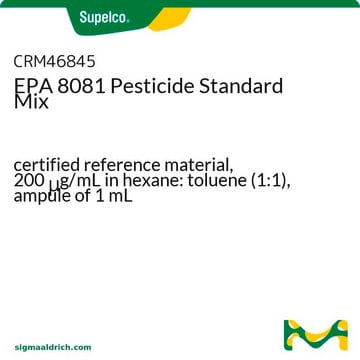40013
1,1,2-Trichlorethan -Lösung
certified reference material, 5000 μg/mL in methanol
About This Item
Empfohlene Produkte
Qualität
certified reference material
TraceCERT®
Produktlinie
TraceCERT®
Analysenzertifikat (CofA)
current certificate can be downloaded
Verpackung
ampule of 1 mL
Konzentration
5000 μg/mL in methanol
Methode(n)
HPLC: suitable
gas chromatography (GC): suitable
Anwendung(en)
cleaning products
cosmetics
environmental
food and beverages
personal care
Format
single component solution
Lagertemp.
2-8°C
InChI
1S/C2H3Cl3/c3-1-2(4)5/h2H,1H2
InChIKey
UBOXGVDOUJQMTN-UHFFFAOYSA-N
Suchen Sie nach ähnlichen Produkten? Aufrufen Leitfaden zum Produktvergleich
Anwendung
Sonstige Hinweise
Rechtliche Hinweise
Signalwort
Danger
H-Sätze
Gefahreneinstufungen
Acute Tox. 3 Dermal - Acute Tox. 3 Inhalation - Acute Tox. 3 Oral - Flam. Liq. 2 - STOT SE 1
Zielorgane
Eyes
Lagerklassenschlüssel
3 - Flammable liquids
WGK
WGK 2
Flammpunkt (°F)
51.8 °F - closed cup
Flammpunkt (°C)
11 °C - closed cup
Persönliche Schutzausrüstung
Eyeshields, Faceshields, Gloves, type ABEK (EN14387) respirator filter
Choose from one of the most recent versions:
Besitzen Sie dieses Produkt bereits?
In der Dokumentenbibliothek finden Sie die Dokumentation zu den Produkten, die Sie kürzlich erworben haben.
Kunden haben sich ebenfalls angesehen
Unser Team von Wissenschaftlern verfügt über Erfahrung in allen Forschungsbereichen einschließlich Life Science, Materialwissenschaften, chemischer Synthese, Chromatographie, Analytik und vielen mehr..
Setzen Sie sich mit dem technischen Dienst in Verbindung.













